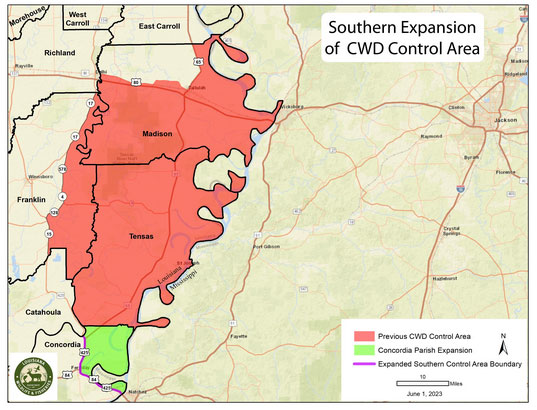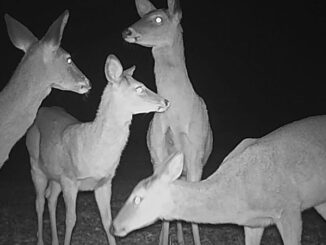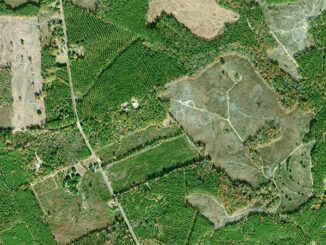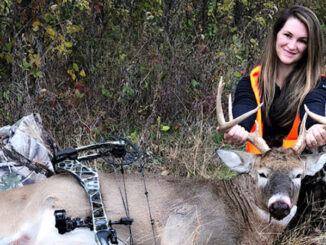
A Louisiana Department of Wildlife and Fisheries’ (LDWF) control area that bans supplemental deer feeding and carcass transportation due to the discovery of Chronic Wasting Disease in Louisiana has been expanded into north Concordia Parish.
The Louisiana Wildlife and Fisheries Commission (LWFC) approved the expansion in their regular monthly meeting June 1. Four of the eight commissioners were absent at the meeting.
The control area has no “sunset” meaning the time it is active could be forever or just temporary.
Open ended regulation
No “Currently, there is no sunset,” said LDWF Deer Program Manager Johnathan Bordelon in a 2022 meeting. “It is going to be left open until we learn more about the disease and conduct surveillance.”
The control area is meant to slow the spread of CWD in the state’s deer herd, specifically along the Mississippi River area. CWD is a neurodegenerative disease that is infectious, always fatal, and has no known treatment.
 Originally, the CWD Control Area took up all of Tensas Parish and portions of Madison and Franklin parishes. Now the area will expand to La. Hwy 425, intersect La. Hwy 84 and go to Natchez, according to Dr. Rusty Berry, assistant wildlife veterinarian. The control area now basically goes all the way to Vidalia.
Originally, the CWD Control Area took up all of Tensas Parish and portions of Madison and Franklin parishes. Now the area will expand to La. Hwy 425, intersect La. Hwy 84 and go to Natchez, according to Dr. Rusty Berry, assistant wildlife veterinarian. The control area now basically goes all the way to Vidalia.
“CWD is a very frustrating disease to say the least to manage and deal with in our state,” Berry said. The veterinarian suggested the enlargement was due to positive CWD samples that where taken further south of the original control area. According to Berry, movement of healthy deer was 25 miles, while CWD-infected deer was unknown.
“We anticipate the (infected) deer movement to be a lot greater,” Berry said. “Some researchers are suggesting 50 to 55 miles, but we a sticking to the known deer movement.”
Further expansion?
The Commission also discussed the possibility of the control area being expanded even further is likely.
In 2022, the control area was met with opposition from landowners, hunters and business owners. Opposition was aired during two LDWF-sponsored public meetings in Franklin and Tensas parishes.
During those meetings participants questioned LDWF officials on the need of such stringent measures. Landowners were concerned about the value of recreational real estate in the banned area. Business owners near or in the area were concerned about loss of revenue especially deer corn. Taxidermists were concerned over carcass exporting rules that could hamper their business.
Opposition was so prevalent that resolutions from area Police Juries and state-level representatives were passed calling LDWF to perform further research before enacting the control area.
Legislative update
Additionally, commissioners heard a Legislative update from their General Counsel Cole Garrett on pertinent legislation at the 2023 Legislative Session that ends June 8. This was the status of pertinent bills at the time of the meeting.
- House Bill (HB) 4 that made it criminal trespass on running waters was involuntarily deferred.
- A bill that created the Imported Seafood Safety Task Force is set on House orders. It would study and make recommendations regarding the funding and enforcement of imported seafood.
- HCR85 also passed the House and was pending Senate Natural Resources and urged LDWF to study the feasibility of allowing a black bear hunting season.
- A bill establishing a $5 bounty for feral hog tails was voluntarily deferred.
- Louisiana Small Wild Catfish Processor’s Act, Senate Bill 161, is pending House floor. This would exempt wild catfish processors selling directly to the consuming public from the sanitary code. It limits exemption to processors who sell 400 pounds or less per month.
- HCR 132 passed the House and was pending Senate Natural Resources. It urged LDWF to work with the Alligator Advisory Council and the WLF Commission to study and make recommendations relative to alligator markets, populations and hunting.
No bills become law until passed by the Legislature and signed by the Governor.


